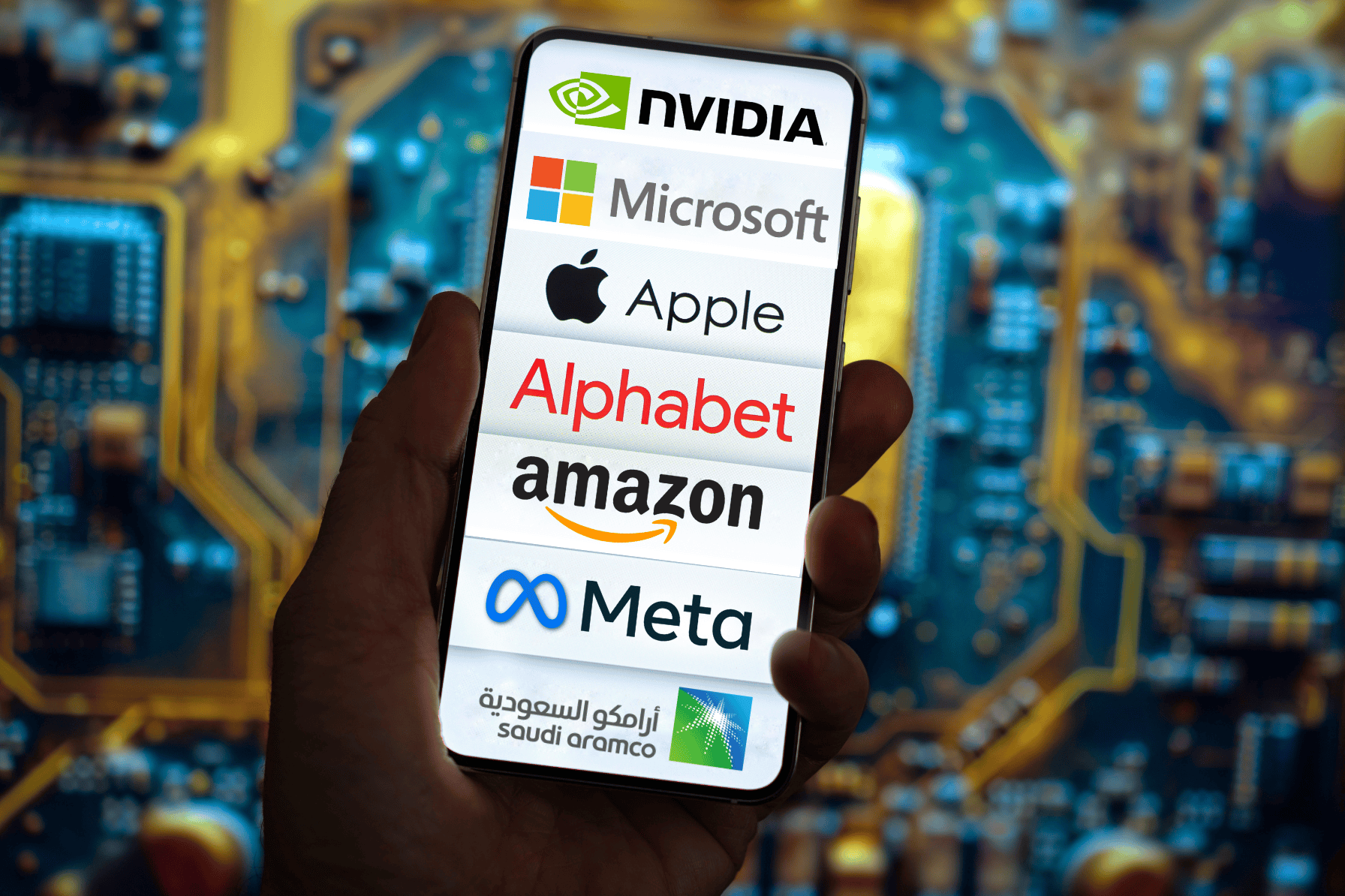The valuation of the largest companies in the world fluctuates day to day, even minute by minute, but true success is a marathon, not a sprint.
You heard the news: on July 9, 2025, propelled by the AI frenzy, the chipmaker Nvidia surpassed the $4 trillion market cap and became the most valuable company in the world by market capitalization. A few days later, Microsoft joined the 4 trillion club, only to retreat soon after. By the time you are reading this, things might—or, indeed, will—have changed yet again.
After all, it wasn’t long ago when the first company to cross the $1 trillion mark was celebrated as a historic milestone. On August 2, 2018, Apple’s stock rose following strong iPhone sales and blockbuster earnings. The Cupertino giant was also the first company to cross the $1 trillion and $2 trillion mark. Yet, even then, its dominance could not to be taken for granted. Over the years, it lost the title of the world’s largest many times—to its nemesis Microsoft, but also Amazon, Google, and even to Saudi Arabia’s state oil giant Aramco. Market capitalization can change quickly, and Nvidia’s recent breakthrough proves it more than ever.
How these companies get to the top, and how they get to stay there, has changed too. That of Apple and Microsoft is a textbook example. Apple has often seen its market cap fall victim to its sales success. While the popularity of products such as the iPhone, Mac and iPads propelled Apple to new heights, whenever sales appeared to slow the market capitalization suffered.
By contrast, Microsoft built itself into one of the world’s largest companies with a focus on steady recurring revenue streams. You might not need a new smartphone or laptop every year, but a software license, cloud-computing package or video game subscription means ongoing payments—and client stickiness.
Then Apple started borrowing from Microsoft’s playbook: it launched news and games subscriptions, a video streaming service, and even its credit card. Once Apple moved beyond hardware to software and services, its revenue growth became seemingly unstoppable. Overtaken by Nvidia and Microsoft, Apple is no longer the world leader by market cap, but its valuation, at about $3.5 trillion (as of August 28, 2025, at the end of the Q2 earnings season), is in the highest range it has ever reached, and nothing to sneer at.
Market Cap Leaders Change With The Times
Today, most of the top 10 companies by market capitalization are technology firms. Until the early 2010s, many of the most valuable firms were traditional long-standing blue-chip industrial behemoths like Exxon, Chevron, General Electric or AT&T.
This is not to say that traditional sectors have lost all their appeal. Saudi Aramco continues to rank in the top 10; Exxon, another oil giant, is holding its place in the top 20; as does U.S. healthcare firm Eli Lilly. Financial firms remain well represented too—Berkshire Hathaway, JPMorgan Chase & Co, Visa and Mastercard are fixtures of the capital markets.
Yet, more often than not, the biggest companies by stock market valuation tend to be tech firms, even if they predominantly appear to make things (like Tesla, still in the top 10 despite losing some steam) or sell things (Amazon). Not only that, but rather than being a one-time purchase, these physical objects can often continue to generate steady and predictable revenue streams over long periods of time. Tesla, for example, has monthly fees for its autopilot and self-driving features, as well as for its premium connectivity package; Amazon offers all kinds of subscriptions and premium subscriptions linked to its Alexa, Fire TV, and Kindle devices.
Today’s Headlines vs. Strong Fundamentals
Successful strategy (and product, and timing, and management) aside, the total dollar value of a company’s outstanding shares can be affected by a myriad of other factors. Generally for good reason, economic data influences investor sentiment and expectations for growth, inflation and interest rates. On the other hand, an online post by US President Donald Trump can often send the stock markets spiraling downward or soaring to new highs without much rationale to support the move.
But the supply of unforeseeable events that can affect the markets is virtually endless. Take, for example, the Covid-19 pandemic. So-called stay-at-home stocks, particularly digital platforms and those in e-commerce, saw significant gains as shutdowns and remote working drove demand for new technologies. Conversely, tourism stocks and live entertainment services plummeted. When vaccines became available and the global economy slowly began to reopen, the landscape shifted once more: companies that had thrived during the shutdowns saw their values drop, while those poised to benefit from the reopening experienced a resurgence.
Focusing too closely on ever-changing share prices and daily events rather than on underlying fundamentals can be misleading. Warren Buffett, the chairman of Berkshire Hathaway (our 10th largest company by market capitalization), famously said that the stock market is a device for transferring money from the impatient to the patient.
Fear often drives decisions when it comes to buying and selling stocks, but even in these tumultuous times, amid lingering high inflation rates, trade disputes, the war in Ukraine and Gaza, and a myriad of other geopolitical tensions and uncertainties, many businesses have experienced little change or have followed somewhat predictable trajectories when it comes assets, market share, revenues, cash flow, headcount, guidance and R&D.
Market Cap Is Not Everything
This is why, to determine which is the largest, Fortune’s annual Global 500 list ranks the world’s top corporations by revenue instead of market capitalization. Where does Nvidia, the most capitalized company in the world, stand in Fortune’s ranking? By using the revenue metric, the world leader in chip-making technology ranks just 66th globally, while supermarket juggernaut Walmart takes the top spot. When ranking companies by revenue, technology stocks do not fare as well as when they are ranked by their market value—consumer staples and discretionary, energy, and healthcare stocks dominate instead.
Why, then, do stock investors often prefer to pour money into startups that generate significant buzz but minimal or no revenue? Precisely because they hope to discover the next Apple or Amazon—respectively the only tech firm and tech-retail hybrid firm that make the Fortune Global 500’s top 10—and turn hundreds into millions. Both Steve Jobs and Jeff Bezos, after all, always maintained that investing in future profitability through new products and services takes priority over hitting earnings estimates.
There is just no simple way to fully ascertain the size, influence and outlook of a company. To that end, the annual Forbes Global 2000 list takes yet a different approach—a multi-dimensional one. It ranks the world’s largest companies by using a composite score achieved by weighing revenues, profits, assets, and market value equally. Once again, different metrics will yield very different results: in this ranking, the financial holding company JPMorgan Chase takes the top spot, while Amazon is only fifth, Apple twelfth, and Walmart barely makes it into the top 20 at eighteenth. Nvidia ranks just forty-seventh.
In conclusion, while it is relatively straightforward—using economic, technical, and organizational criteria—to tell a large company from a small one, determining which is truly the largest is far more complicated. Is it Nvidia, with its massive market capitalization; Walmart, with revenues through the roof and almost 11,000 stores across 19 countries; or JPMorgan Chase, with its huge assets and soaring profits?
Size, like many things in life, is in the eye of the beholder.
Largest Companies in 2025
| Rank | Company | Sector | Country | Market Cap ($B) |
|---|---|---|---|---|
| 1 | NVIDIA | Information Technology | USA | 4232.57 |
| 2 | Microsoft | Information Technology | USA | 3766.31 |
| 3 | Apple | Information Technology | USA | 3445.05 |
| 4 | Alphabet | Information Technology | USA | 2578.30 |
| 5 | Amazon | Consumer Dicretionary | USA | 2442.26 |
| 6 | Meta | Information Technology | USA | 1855.59 |
| 7 | Saudi Arabian Oil | Energy | Saudi Arabia | 1527.00 |
| 8 | Broadcom | Information Technology | USA | 1398.77 |
| 9 | Taiwan Semiconductor Manufacturing | Information Technology | Taiwan | 1197.26 |
| 10 | Berkshire Hathaway | Financials | USA | 1085.54 |
| 11 | Tesla | Consumer Dicretionary | USA | 1076.88 |
| 12 | JPMorgan Chase & Co | Financials | USA | 828.83 |
| 13 | Walmart | Consumer Staples | USA | 773.94 |
| 14 | Tencent Holdings | Information Technology | Hong Kong | 706.37 |
| 15 | Eli Lilly & Co | Healthcare | USA | 693.36 |
| 16 | Visa | Financials | USA | 677.74 |
| 17 | Oracle | Information Technology | USA | 635.16 |
| 18 | Mastercard | Financials | USA | 538.15 |
| 19 | Netflix | Information Technology | USA | 513.42 |
| 20 | Exxon Mobil | Energy | USA | 487.25 |
*As of August 28, 2025
Fortune Global 500
| Rank | Company | Revenues ($M) | Profits ($M) | Assets ($M) | Employees |
|---|---|---|---|---|---|
| 1 | Walmart | 680,985 | 19,436 | 260,823 | 2,100,000 |
| 2 | Amazon | 637,959 | 59,248 | 624,894 | 1,556,000 |
| 3 | State Grid | 548,414 | 10,045 | 797,694 | 1,354,310 |
| 4 | Saudi Aramco | 480,194 | 104,982 | 645,097 | 75,118 |
| 5 | China National Petroleum | 412,645 | 22,424 | 607,615 | 985,155 |
| 6 | Sinopec | 407,490 | 8,036 | 375,395 | 495,096 |
| 7 | UnitedHealth | 400,278 | 14,405 | 298,278 | 400,000 |
| 8 | Apple | 391,035 | 93,736 | 364,980 | 164,000 |
| 9 | CVS Health | 372,809 | 4,614 | 253,215 | 259,500 |
| 10 | Berkshire Hathaway | 371,433 | 88,995 | 1,153,881 | 392,400 |
| 11 | McKesson | 359,051 | 3,295 | 75,140 | 44,000 |
| 12 | Volkswagen | 351,093 | 12,275 | 655,317 | 646,501 |
| 13 | Alphabet | 350,018 | 100,118 | 450,256 | 183,323 |
| 14 | Exxon Mobil | 349,585 | 33,680 | 453,475 | 60,900 |
| 15 | Toyota Motor | 315,110 | 31,258 | 624,467 | 383,853 |
| 16 | China State Construction Engineering | 304,121 | 3,667 | 438,013 | 361,249 |
| 17 | Cencora | 293,959 | 1,509 | 67,102 | 44,000 |
| 18 | Shell | 289,029 | 16,094 | 387,609 | 96,000 |
| 19 | JPMorgan Chase | 278,906 | 58,471 | 4,002,814 | 317,233 |
| 20 | Costco Wholesale | 254,453 | 7,367 | 69,831 | 333,000 |
*As of March 31, 2025
2025 Forbes Global 2000
| Rank | Name | Headquarters | Industry | Sales Revenues ($B) | Profit ($B) | Assets ($B) | Market Value ($B) |
|---|---|---|---|---|---|---|---|
| 1 | JPMorgan Chase & Co | USA | Banking | 285.11 | 59.36 | 4357.86 | 677.80 |
| 2 | Berkshire Hathaway | USA | Insurance | 371.43 | 89.00 | 1153.88 | 1145.46 |
| 3 | ICBC | China | Banking | 221.96 | 50.84 | 6688.60 | 251.33 |
| 4 | Saudi Arabian Oil | Saudi Arabia | Oil & Gas Operations | 480.15 | 104.97 | 645.03 | 1663.38 |
| 5 | Amazon | USA | Retail and Wholesale | 637.96 | 59.25 | 624.89 | 2005.64 |
| 6 | Bank of America | USA | Banking | 196.53 | 27.85 | 3349.42 | 300.06 |
| 7 | China Construction Bank | China | Banking | 196.71 | 46.64 | 5558.26 | 219.81 |
| 8 | Agricultural Bank of China | China | Banking | 198.02 | 39.20 | 5923.64 | 212.51 |
| 9 | Alphabet | USA | IT Software & Services | 359.31 | 111.00 | 475.37 | 1973.64 |
| 10 | Microsoft | USA | IT Software & Services | 261.80 | 92.75 | 533.90 | 2913.01 |
| 11 | Apple | USA | Technology Hardware & Equipment | 395.76 | 96.15 | 344.08 | 3143.82 |
| 12 | Bank of China | China | Banking | 177.05 | 32.30 | 4855.83 | 164.71 |
| 13 | ExxonMobil | USA | Oil & Gas Operations | 339.91 | 33.68 | 453.48 | 469.60 |
| 14 | Toyota Motor | Japan | Consumer Durables | 308.57 | 33.65 | 602.41 | 244.39 |
| 15 | HSBC Holdings | United Kingdom | Banking | 145.25 | 22.97 | 3017.05 | 196.16 |
| 16 | Wells Fargo | USA | Banking | 124.00 | 20.00 | 1950.31 | 227.44 |
| 17 | UnitedHealth Group | USA | Insurance | 410.06 | 22.11 | 309.79 | 382.94 |
| 18 | Walmart | USA | Retailing | 680.99 | 19.44 | 260.82 | 762.32 |
| 19 | Samsung Electronics | South Korea | Technology Hardware & Equipment | 220.63 | 24.65 | 349.51 | 259.77 |
| 20 | Goldman Sachs | USA | Diversified Financials | 120.09 | 14.88 | 1766.00 | 169.34 |
*As of April 25, 2025
EDITOR’S NOTE: The annual Forbes Global 2000 ranks the world’s largest companies, listing the “best” based on Forbes’ composite score of revenues, profits, assets, and market value.




